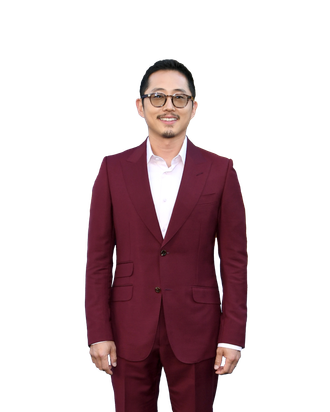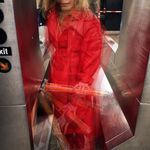
Nope takes place 40 miles north of Hollywood in the arid hills of Agua Dulce, where there’s space for horse ranches and for flying saucers to lurk in the clouds and go largely unnoticed. But show business still exudes a gravitational pull on all the characters, and none more so than Ricky “Jupe” Park, the former child star played by Steven Yeun. While siblings OJ (Daniel Kaluuya) and Emerald (Keke Palmer) struggle to keep their father’s equine performer operation going, on the neighboring property, Jupe is running a two-bit Western theme park and trying to capitalize on the remnants of his decades-old fame as the sidekick in a movie called Kid Sheriff. OJ and Emerald are Nope’s scrappy heroes, trying to carve a little something for themselves out of a historic revelation by attempting to get footage of the UFO on camera. But Jupe is the movie’s tragic figure, still holding out hope that he’ll figure out a way back to the spotlight.
Nope is the third movie from Get Out and Us director Jordan Peele, and it’s a horror-comedy-sci-fi freakout rife with mystery and the threat of death from above. And yet the movie’s most gruesome moments have nothing to do with aliens at all. They instead involve the sitcom Jupe starred in in the ’90s, and the very bad thing that happened on set one day. The more we learn about the incident, the more Jupe’s practiced smile seems to represent a world that has permanently lost touch, having been warped by its obsession with spectacle. Not that that’s something Yeun needs to worry about. When Vulture caught up with him by phone to talk all things Nope, he shared that the key to horror, to him, is that “when you go through that genre, on the other end, there’s just these people left in their humanity.”
Are you a UFO person?
Oh, I’m such a UFO person. When that New York Times article came out, I was showing everybody. But it was weird — around that time, nobody cared. It was so strange. It felt like we had been so drip-fed, that when it finally was like, Yeah, we might have seen them, we were like, Okay. It was just like, “What’s happening right now?”
But yes, I’m definitely a UFO person. I’m just into hoping that there’s other beings out there and we’re not alone.
Do you have any expectations about what contact with alien life might be like? That gets some of the people in the film in trouble.
Well, not to get too heavy about it, but for me, the transformation is more internal. What happens when you get confirmation that there’s life outside, even if it’s an amoeba? What does that do to you? What does that do to every structure that we’ve ever relied on? I have no idea, but that’s always the fascinating part to me.
So your character, Jupe, is a former child star who’s now running this Western-themed amusement park. Were there any particular real life actors he was inspired by? As a half-Chinese child of the ’80s, my mind went immediately to Ke Huy Quan [of The Goonies and Short Round fame], who was pretty much the only Asian kid I remember seeing onscreen growing up.
The original script actually had Jupe as the lead of this movie [that made him famous], Kid Sheriff. And when I jumped in, Jordan really allowed for a lot of collaboration. And the first thing I said was, “I don’t think he was the lead of this movie.”
Jonathan Ke Quan was a big example. This movie is a lot about exploitation. For me, there’s also an agency to it. I didn’t want Jupe to merely just be a victim of circumstance, but to also, as an adult, desire something and have his own agency towards something. So it felt more right for him to be a side character in his youth.
When Keke Palmer’s character puts together who Jupe is — “Oh, you were the Asian kid in Kid Sheriff!” — I thought of the story in your GQ profile from last year where someone says something similar to you on the street: “Hey, it’s the Asian guy from The Walking Dead!” It’s recognition plus the implicit loneliness of being the one.
At large, the same feeling applies. There’s a unique sense of isolation that comes when you’re just boiled down to your race. But it’s a dehumanization nonetheless — defining somebody to put them in a box. And I think that feeling, that deep sense of loneliness is what Jupe inhabits. How can you connect, really, with anybody when there’s a lack of authenticity even in yourself?
There’s definitely a pathos to Jupe. He was involved in an almost hilariously upsetting event on a sitcom set when he was young, but as an adult, he seems almost chipper about it — describing the Saturday Night Live sketch about what happened instead of the incident itself. Did you think of him as someone who was stuffing all this trauma down inside, or does he just operate in a different way?
He’s told the story so much that perhaps he doesn’t even view it as trauma, but just this incident that happened. I don’t know if he has had a clear sense of what had happened to him — especially because SNL parodied it. How gnarly it is to parody something like that?
I think he’s just deeply caught in other people’s projections about who he is. And part of where the agency comes from with that character is that I wanted him to want it as well. In some ways, it’s sometimes easier to live within the projection that everybody puts upon you than it is to resist it and fight every day against it. And when you’re alone like that, and when you don’t really have a family situation to lean on to keep you safe and sane, it can destroy you. Jordan says this really well, but the violence of attention is an interesting concept to me, especially when it pertains to Jupe.
There are many ways in which the movie is about how we are in a dysfunctional relationship with fame and attention. Jupe even has a side hustle monetizing his notorious childhood tragedy.
Absolutely. For me, the key that makes Jupe’s story unsettling is the reciprocal nature of our obsession with attention. What will we do to deny ourselves our own truth in order to be quote-unquote seen, or part of something, or accepted? We’re always in the throes of that. Any movement forward in the business itself — which is inherently about spectacle — becomes a mold of what you can monetize. Who’s going to use it, and who’s not? And there’s no judgment, it’s really just the relationship that we have.
We had a lot of discussions, Jordan and I, about where we sit in the modern age of Hollywood, on the newer side of being included in the space. I feel like there’s an inherent infantilization that happens, even if you’re an adult, because you are having to fight decades and generations of stereotypes and expectations and projections on you, the gaze itself. He’s touching a pretty large thing, I think.
One of the other themes running through the movie is who gets to own and control images. I’m curious about what that idea means to you, and if it has resonance with what you do as a producer in addition to acting.
There’s always a desire to control and to want to get control. And then at the end, there’s this surrender to just letting it go as well.
For me, what I want to help produce, what I want to put out there, what I want to be a part of are things that don’t escape gaze. Because I think that’s largely impossible. I think everybody’s going to speak from a point of view, and that’s fine, but how much of a specific point of view has been told for so long that we deemed that as actual reality? And then what happens when someone who doesn’t speak from that point of view — unabashedly, with courage, speaks from their point of view and has it become a massive success?
It freaks out the world for a second, and I’m into that. I’m into seeing if we can render people free of the too-oppressive gaze upon them. Depending on the story, sometimes people need to be viewed in that lens, and sometimes they don’t. And for me, as an Asian American actor and producer, I’m interested in speaking from another angle. That’s where I’m at.
What was the process of joining Nope like? Did Jordan reach out to you?
Yeah. Jordan hit me up, offered this role to me, and really opened the door for collaboration. He didn’t just say, “Here’s the role. Here’s the lines.” He made that space for me to chime in. That was the joy of the journey of this one, just talking with him and getting to the bottom of a lot of the steps.
When you look at Jordan’s movies, a lot of people want to say that it’s socially conscious horror or something like that. But for me, it feels like all he’s really doing is stripping a couple layers between the metaphor and reality. If these monsters are supposed to be social commentary from back in the day about a deep effect in all of us, what happens when you take away the metaphor and instead go, “Hey, that’s also very close to you. It’s you.” That feels freaky to me.
Horror has been a recurring element throughout your career — this and The Walking Dead, but there are also elements of horror in Mayhem and Okja and The Humans as well. Do you have a personal affinity for the genre?
I don’t know if I have a personal affinity. Maybe everything’s horrific.
More on 'Nope'
- The Last of Us Nominated for Best Kiss at MTV Movie & TV Awards
- Oscar Futures: Is the Academy Ready to Forgive Will Smith?
- Keke Palmer’s Nope Press Tour Deserves an Archive





